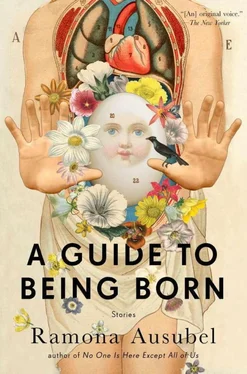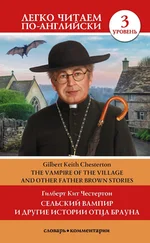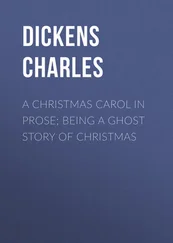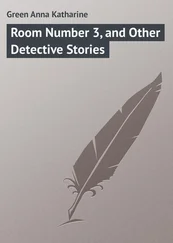“Do you think he’s OK?” the girl asked.
“Sure he is,” said the boy.
“What about Mae Peterson?” the girl asked.
“Just because she died doesn’t mean the whole place is going to drop.”
“One person dying doesn’t stop another,” she said. “Let’s stay here and keep watch.” She almost thought she would feel better if she got to see someone die. Like skipping ahead to the end of the book. After that, all the particular events in the middle don’t matter as much: they go to the same place. The moon was making its regular attempts at light. The boy’s and girl’s hands were white from it.
The girl was sure the old man was dead now, sure that soon his nurse would return and put her ear up to those drooping lips and gasp because there was no air going in or coming out, and she’d call 911 and pretty soon ambulances and fire trucks would be there making their whirling calls, and all the neighbors would come out to watch, standing around the girl and boy, in their bathrobes and glasses. Their hair mussed from sleep, their slippers soaking up the dew on the ground. The paramedics would wheel the old man out on a stretcher, and everyone would whisper what a nice man he was and a few people would look covetously at his house and wonder if they could afford to buy it now or if it would just get passed down anyway.
The moon traveled from the top of the sky to a few inches from the bottom. It began to pinken and the dogs and their walkers started to come out. The blue-haired women in their shiny black suits came out of big doors with small dogs and started to power walk into the day. They adjusted their radios and their waistbands and headed out. They had big Christmas dinners to burn off now, step step step step. Their old-lady hips went back and forth. They waved to each other. “Jean,” said one woman to another, loud, over the sound of her oldies, “you look as skinny as a rail.”
The other woman waved her hand dismissively and said, “Oh, Anne, you’re too kind.” They both smiled and power walked on, not even looking down at the girl and boy cross-legged in their path.
“We could go home now, to our own house,” the boy said, but the girl shook her head.
“Not yet,” she told him.
When the morning light was at full volume, the men and women got into their cars and went to the mall to return all the unwanteds in exchange for amazing bargains.
The boy asked, “Aren’t you hungry?”
“No one else is paying attention,” the girl told him. “We have to be the ones to see what happens.”
And then, while everyone else in town was preparing lunch, the man on the couch simply got up. He sat first, then stood.
“Is he a ghost?” the girl asked.
“He’s a man,” said the boy. The man let the plaid blanket fall next to him. He stretched, reaching far above his head. He was tall and his skin was like a cloak draped over his arms.
“What is he doing?” the girl asked.
“Maybe he needs to go to the bathroom. Maybe he wants a cup of coffee. Maybe someone will come to visit him today.”
The girl began to cry. “How does it end?” she asked.
The boy went to the door and rang the bell. “How are you?” he asked when the man answered.
“I’m excellent,” said the old man. “But I’m having my breakfast. Can I help you with something?”
“Happy New Year,” the boy told him, “was all we wanted to say.” He motioned to the girl out on the sidewalk, and the old man waved to her, smiling. The boy waved too, his young hand and the man’s old hand like flags from neighboring countries. They smiled at either end of life, and the girl could see real, definite happiness in their faces.
The girl and boy wrapped themselves together in bed that afternoon, the curtains drawn against the sun.
“My gift to you is this,” the boy said, kissing her neck. A lineup of porcelain bears, given to the girl by her mother over a series of birthdays, looked on. The bears played dumb. Didn’t even shift to chat with one another. Just watched with their big sloppy eyes while the boy and girl tangled themselves up and breathed into each other’s mouths and forgot everything that hadn’t yet happened, until there wasn’t any light left to see by and they knew each other only by feel.
FAUSTUS MACELOVICH from the English Department had to come to the lecture by the Nobel Laureate, just as everyone did. He needed to appear in the crowd and shake hands with the other professors. This was far beyond his normal cheese Danish and crumblingly old book at the dining room table routine, where his recently dead wife looked down on him from a giant painting, done by Faustus himself upon their return from her first bad-news doctor appointment. This was a special night, a night on which each professor hoped to shake the hand belonging to the body belonging to such an important mind. They all knew that as they fell asleep that night, they would dream of their acceptance speech for that same storied award, remembering to thank the secretaries and the deans and the chairs and the chancellors and vice chancellors and the provost and the vice provost and the president, and vowing to always show up to each and every lecture they were to give, early, not like this ungrateful person. These professors knew that if they were honored they would never, never forget where they came from. They would arrive everywhere bearing gifts for their hosts. Beautiful fruit baskets, chocolates imported from villages so small they didn’t even have names. What grateful, humble, well-deserved recipients they would be!
They now stood in the red-velvet-seated auditorium with many others from across the departments. The professors had all attended lectures here countless times: physicists, poets, ethnomusicologists, archivists. As usual, there were cookies and cheese and coffee urns and small paper cups. As usual, they cordialed and greeted and congratulated and acted nice whether or not it was sincere. Faustus endured the sympathy for his lost wife from some and appreciated it from others and was avoided by many who did not know what to say.
He had practiced for this, his reintroduction. He had read the sports page and was armed with knowledge of the baseball season and the basketball draft. He had prepared a list of conversation topics. “This new pitcher the Dodgers have, what a terrible choice,” he would say, “but I do think the center from Duke has incredible potential,” and even, “Won’t you join me in moving to Canada if the Republicans win next year?” He feared asking others about their spouses and children, because he did not want to have to speak about his own family.
It did not used to be hard, this place where his life-life and his work-life met up. Aside from committees and meetings and budgets taking up ever more time, he had always felt like one of the rare men to be completely fulfilled. He used to arrive on time to all the faculty parties and watch his wife across the room make intelligent, witty remarks to the delight of senior members of his department. Sometimes he thought Petra was as responsible for his making tenure as he himself was. Now that she was gone, he did not know how to stand in this room right. He looked around at the familiar faces, some people he had known for decades, and was filled with the sense of being incomplete—not enough of a person to do his job. He was paid for his mind, but at this moment he did not know how to find his mind within the shimmering sorrow of his heart. The questions he had spent his career considering seemed like kickable little stones compared to the topography of this loss.
He had counted on the cookies to be enough to get him through the milling period, but this was getting to be an unusually long one. In the lecture hall, the professors began to tire of milling. They wanted to sit down. They wanted at this hour to listen and, many of them, to doze. This was supposed to be the reward—a place where everyone believed as they did—after days spent laboring in classrooms, waving their arms, each wave a misunderstood expression of their love of the subject: a mathematical wave, a wave to the beauty of the Principles of Physics. The slippery-eyed students in their straight rows, the visible boredom surrounding them in gray clouds, asked, “But, Professor,” adjusting their miniskirts or basketball shorts, “how many academic sources do we need?”
Читать дальше












